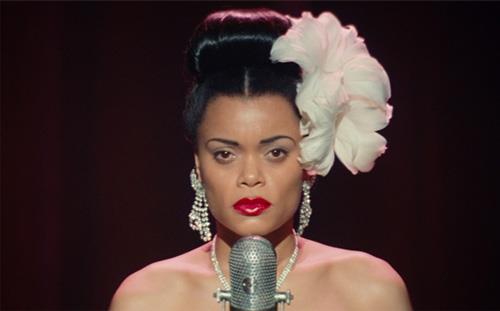
The United States vs. Billie Holiday, a new film available Friday on Hulu, has all the subtlety of a lynching.
That's not a metaphoric accident since the premise of The United States vs. Billie Holiday is that the Federal Bureau of Investigation pretty much lynched one of the 20th century's great singers.
Directed by Lee Daniels from a screenplay by Suzan-Lori Parks, United States vs. Billie Holiday covers the last two decades of Holiday's life, which ended in 1959.
She was 44, and she was also handcuffed to the hospital bed in which she died because federal agents had arrested her.
Andra Day plays Holiday, stepping into the shoes of both the singer herself and two first-rate singer/actresses who have prominently portrayed her, Diana Ross and Audra McDonald.
Day earns her place in that company, nailing Holiday's unique voice and phrasing while capturing the strength, bravado, self-doubt, and anger that fueled Holiday's whirlwind ride through life.
Holiday was capable of creating plenty of problems for herself, including serious drug abuse and bad decisions about menfolk. She was not always kind to herself or those around her.
Still, a nightmare childhood that included rape and prostitution makes it clear she was victim, not villain.
FBI boss J. Edgar Hoover's obsession with Holiday, the core premise of the story here, was rooted in her performance of "Strange Fruit," a song that decried the murder of men, almost always Black men, by vigilante mobs.
As Hoover is unseen, the surrogate villain becomes Harry Anslinger (Garrett Hedlund), head of the Federal Bureau of Narcotics and hand-picked by Hoover to neutralize Holiday on the premise of intensifying the war on drugs.
In reality, Daniels and Parks bluntly assert, Hoover and Anslinger were racists who targeted Holiday because they hated the anti-lynching message of "Strange Fruit," which talked about bodies hanging from trees and swaying in the Southern breeze.
The song was written by Abel Meeropol, whom Hoover and Anslinger further hated for being "a commie." But it was Holiday's popular performance they considered most dangerous.
"Drugs and n-----s are a contamination to our great American civilization," Anslinger declares to a sympathetic roomful of smug White congresspeople who are happy to fund his crusade.
The film follows the well-documented path of Holiday's real life. She was imprisoned for drug use, nominally because she refused to identify her suppliers. When she was released, Anslinger made sure she could not regain her cabaret license, which meant she was shut out of the live performances by which she made her living.
Hemmed in by this vindictive squeeze and several questionable characters around her, she returned to drugs. She remained a beloved artist and was able to find some work in Europe, but the pressure wore her down.
She gets support from friends like Tallulah Bankhead (Natasha Lyonne), who has a prominent role here because she defies FBI efforts to find something sordid in Bankhead's relationship with Holiday.
Holiday's most troubling dilemma, in some ways, is Jimmy Fletcher (Trevante Rhodes), one of the first Black FBI agents. While Hoover and Anslinger don't want or like Black agents, they need a couple to infiltrate Black communities and find something on people like Billie Holiday.
Fletcher, a middle-class man who considers drug abuse the scourge of his people, agrees to fake his way into Holiday's circle and eventually bust her.
This makes him seem like the worst sort of traitorous rat, which is how Holiday at first regards him. But he gradually develops enough ambivalence and remorse, so he evolves into the second-most complex character here, trailing only Holiday herself.
He develops a genuine affection for her which, on several levels, she reciprocates. Not surprisingly, he is periodically reminded that the White people who run things don't like him any more than they like her.
The flashpoints of racism in The United States vs. Billie Holiday are overt, frequent, and infuriating, as is the indifference of the smug White folks presiding over an unapologetically segregated culture.
The dialogue that underscores these points can feel stilted at times, like when a worried White man suggests "Strange Fruit" may foreshadow a civil rights movement. The story itself takes some hairpin turns to ensure we don't miss particular indignities.
Its longer arc feels true, and the chaos of Holiday's off-stage life is balanced nicely by extended music segments in which Day does justice to Holiday classics like "In My Solitude," "All of Me," or "Tain't Nobody's Business."
"Strange Fruit" feels symbolic, the false "evidence" used to justify a false verdict of guilt.
Billie Holiday's story continues to be told, and doubtless will be told again. As with a good song, a good singer will always find something in it that's different and fresh.